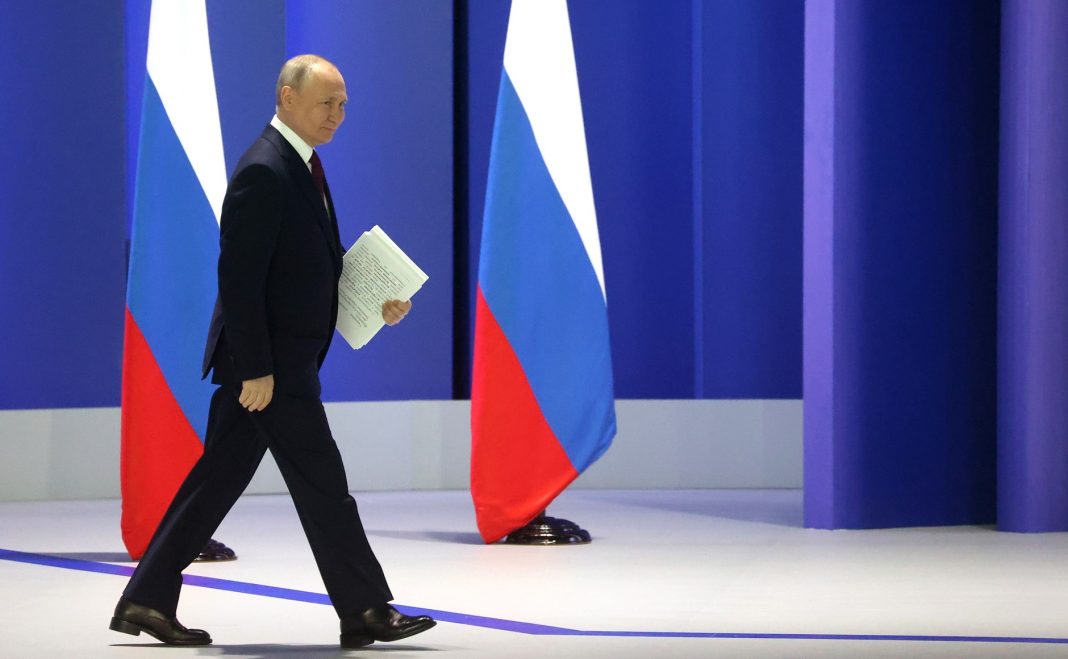Both in Russia and abroad, many people were waiting for Putin’s Address to the Federal Assembly. Perhaps, those outside Russia were waiting even more than the Russians themselves. Initially, the text and even the Address’s theses were kept entirely secret.
Ascolta sources report that a team of assistants to the President of the Russian Federation was preparing two versions of the Address. The first is confrontational and uncompromising, aimed at calling for a war against the West, for a counter-terrorist operation against Ukraine, for the transition of the economy to a market economy, and criticising the government for its inability to ensure this transition. The second was softer, with an assessment of the political situation in the world, with an analysis of the results of the so-called “SMO”. It also was aimed to support the government’s economic programs and indicate that everything is going well; yet, there should be no limit to perfection, social initiatives with an overall statement: “we live in a hostile environment, but we live good!”
Originally Russia and the United States agreed on Joe Biden’s visit to Kyiv and international negotiation platforms. However, later on, they started talking about the possibility of positive shifts in relations between the two countries, and it became clear that Putin would deliver a light version of the Address.
A minute before the announcement of Putin’s Address to the Federal Assembly, the announcer solemnly asked all present to take their seats and turn off their mobile communications. Nevertheless, people in the hall continued to communicate, occasionally interrupted, only to take another selfie. After a year of total sanctions, accompanied by loud statements by Russian politicians about the rejection of “everything Western”, the number of iPhones among deputies, senators and other invitees has not decreased.
Uncharacteristically, Putin showed unexpected punctuality: his speech was only six minutes late. As Ascolta noted earlier, it was focused on domestic politics, a large number of words of gratitude to the participants of the so-called “SMO”, social workers, entrepreneurs, politicians and everyone who is a potential electorate of Putin and the current government.
“With today’s Address, I am speaking at a difficult, milestone time, at a time of cardinal changes throughout the world,” Putin began. His words were supposed to resemble the famous Stalinist ones in tone: “Comrades! Citizens! Brothers and sisters! Soldiers of our army and navy! I turn to you, my friends!”
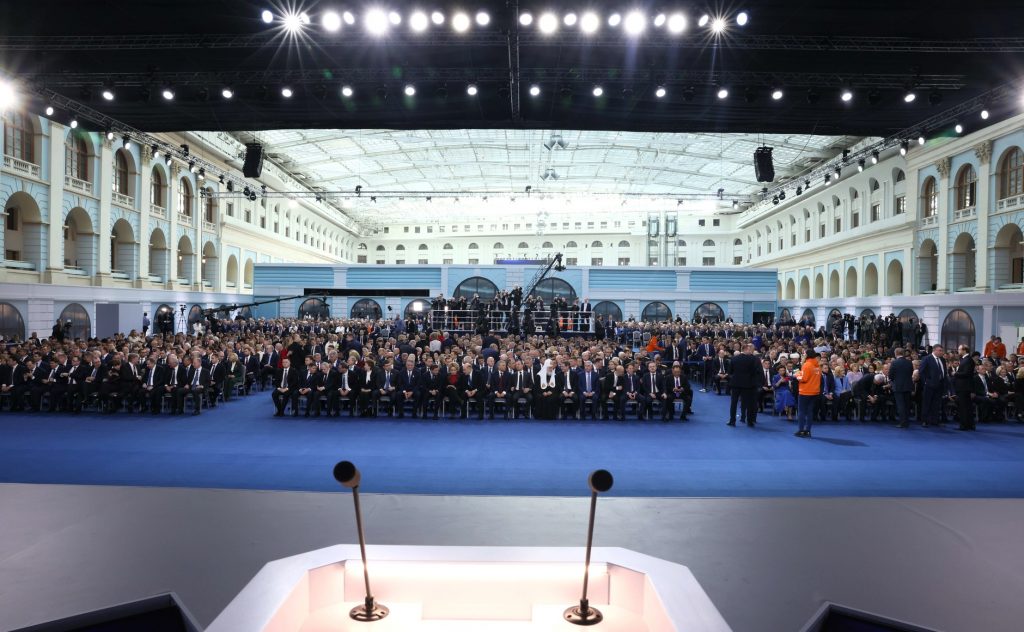
As expected, Putin started his election campaign by describing its main aspects: education reform, new social and infrastructure facilities, increased independence from internal factors and the search for new markets. The Ukrainian issue was also given quite a bit of time, but it was not a key issue in the Address.
Interestingly, a group of political technologists working on Staraya Square did everything to ensure that the Address was riveted to the attention of the whole people and not just the attention of the elites. They made an event out of the Address: they hung up boards, advertised in the media, and tried to create some kind of intrigue (they launched false signals that Putin would declare war on Ukraine or a counter-terrorist operation). A week ago, Ascolta experts said that the Address would focus on the Russian economy in wartime.
The Address itself can be divided into several parts, each of which deserves special attention.
On war and peace:
• “A year ago, to protect people on our historical lands, to ensure the security of our country, to eliminate the threat from the neo-Nazi regime that emerged in Ukraine after the 2014 coup, it was decided to conduct a special military operation. And we will step by step, carefully and consistently solve the tasks we face.”
• “Russia did its best to resolve the Ukrainian crisis peacefully, but behind its back, a “completely different scenario” was being prepared.
• “The promises of the Western rulers, their assurances about the desire for peace in the Donbas turned out, as we now see, to be a forgery, a cruel lie. They played for time, engaged in chicanery, turned a blind eye to political assassinations, to the repressions of the Kyiv regime against objectionable people, to the mockery of believers, and increasingly encouraged Ukrainian neo-Nazis to carry out terrorist actions in the Donbas.”
• “Russia was open to dialogue with the West on security, but in return received hypocritical reactions and NATO expansion.”
• “It was they (the West) who unleashed the war. And we use force to stop it.”
• “At a recent conference in Munich, there were endless accusations against Russia. One gets the impression that this was done only so that everyone would forget what the so-called West has done in recent decades. And they let the genie out of the bottle, plunged entire regions into chaos.”
• “Let me remind you that in the 30s of the last century, the West opened the way for the Nazis to power in Germany. And in our time, they began to make “anti-Russia” out of Ukraine. So the project is not new. People who are at least a little immersed in history know perfectly well: that this project goes back to the 19th century; it was cultivated in the Austro-Hungarian Empire, Poland, and other countries with one goal – to tear off these historical territories, which today are called Ukraine, from our country. That’s what this goal is. There is nothing new, no novelty; everything is repeated.
• “It is impossible to defeat Russia on the battlefield.”
This is Putin’s traditional rhetoric. He opposed Russia to the West, challenging the Western world and civilization. This is the “Anti-Fulton speech” (the first part of the Address largely corresponds to the Fulton speech of Winston Churchill on March 5, 1946, in which the idea of an “iron curtain” was first voiced to delimit the USSR and the outside world; now the “iron curtain” is initiated by Putin).
So, the blame for the escalation of tension in Europe lies entirely with the West; the West has been declared a universal evil. In principle, it was moving towards this. Throughout the year, Putin tried in every possible way to show that the global rift between the Western world and the rest of the world had taken place and that Russia was at the forefront of the “anti-Western revolt.” The new ideological concept of Russia, which replaced the concept of the “Russian World”, comes down to the fact that Russia is the vanguard of fighters for traditional values against globalism.
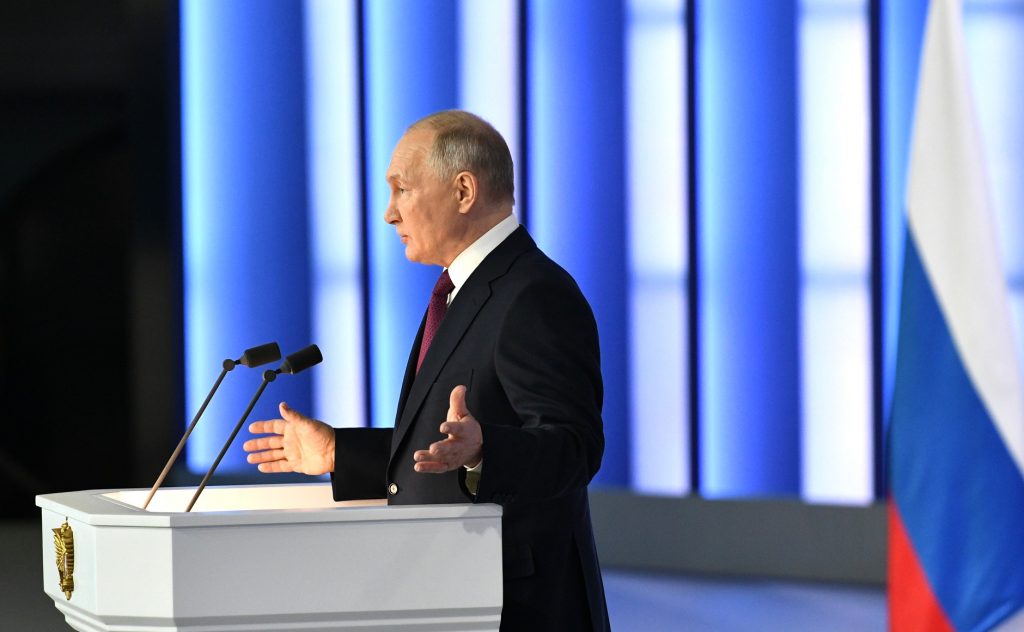
On Ukraine:
- “Neo-Nazis do not hide whose heirs they consider themselves to be. So it is surprising that in the West, none of the powers that be noticed. Why? Because they excuse me for bad manners, I do not care. It doesn’t give a damn whom to bet on in the fight against us, in the fight against Russia. The main thing is that they fight against us, against our country, which means that everyone can be used.”
- “The project “anti-Russia” is, in fact, part of the revanchist policy towards our country, to create hotbeds of instability and conflicts right at our borders. And then, in the 30s of the last century, and now the plan is the same – to direct aggression to the east, to kindle a war in Europe, to eliminate competitors by proxy.
- For the first time, Putin called Ukraine not a country but a territory now named “Ukraine”.
- “We are not at war with the people of Ukraine; I have already spoken about this many times. However, the people of Ukraine themselves became a hostage of the Kyiv regime and its Western masters, who occupied this country in the political, military, and economic sense destroyed Ukrainian industry for decades, and plundered natural resources.”
- “Responsibility for inciting the Ukrainian conflict, for the escalation, for the increase in the number of its victims lies entirely with the Western elites and, of course, with the current Kyiv regime, for which the Ukrainian people are, in fact, a stranger. The current Ukrainian regime serves not national interests, but the interests of third countries.”
- “The more long-range means the West will give to Kyiv, the further the Russian Federation will be forced to move the threat to itself.”
Putin once again stressed that for him, there is no concept of “war in Ukraine” or “war with Ukraine.” For him, Ukraine is a field of confrontation with the West. Ukrainians are not enemies but hostages of the “Western masters”. This is the main message directly for the Ukrainians: so far, the concept of the so-called “SMO” does not provide for weapons of mass destruction, carpet bombing, nuclear strikes, or massive strikes on cities. Putin does not consider Ukraine a subject; Ukrainians are equal opponents. In his concept, these are “territories” inhabited by “misguided” Russians who have fallen into the “heresy of Ukrainianism,” who have temporarily moved away from their all-Russian roots, and who must be returned. Therefore, the war is being waged not so much against the Ukrainians as against the “Nazis” and their Western masters.
In fact, a signal was sent that Putin will not talk about peace with Ukraine – only with the United States and NATO, because Ukraine is subjectless.
A signal was also sent that Putin is ready to stop at certain territorial gains; however, if weapons appear in the territory of Ukraine that can reach the territory of the Russian Federation, Russia will have to go on the offensive, making attacks on the Chernihiv, Sumy, Kharkiv regions – that is, creating a “sanitary corridor “. De facto, this is blackmailing the West: if you want us not to continue the offensive, refuse to supply weapons and shell Russian territory.
On West:
- “The elites of the West make no secret of their goal: to inflict – as they say, this is direct speech – “a strategic defeat of Russia”. What does it mean? For us, what is it? This means finishing with us once and for all; that is, they intend to transfer a local conflict into a phase of global confrontation.
- “The West has already spent more than $150 billion on aiding Kyiv and supplying it with weapons.”
- “Look what they are doing with their peoples: the destruction of the family, cultural and national identity, perversion, bullying of children, up to paedophilia, is declared the norm, the norm of their life, and clergy, priests are forced to bless same-sex marriages. God bless them; let them do what they want.”
- “Millions of people in the West understand that they are being led to a real spiritual catastrophe. The elites, frankly, are just going crazy, and there doesn’t seem to be a cure.”
- “Obviously, the West will try to undermine and split our society, to rely on national traitors who at all times – I want to emphasise this – have the same poison of contempt for their Fatherland and the desire to make money by selling this poison to those who are willing to pay for it.
Double message: for Russians – “the enemy is at the gate”; for people in the West – everyone who disagrees with liberal innovations, same-sex marriage, militant feminism, etc. – “Under our banners!”. This is an attempt by Russia to flirt with the right in the West (previously, the stake was mainly on the left). Now it is necessary to closely monitor the contacts of representatives of right-wing parties with Moscow – especially on the eve of the elections to the European Parliament.
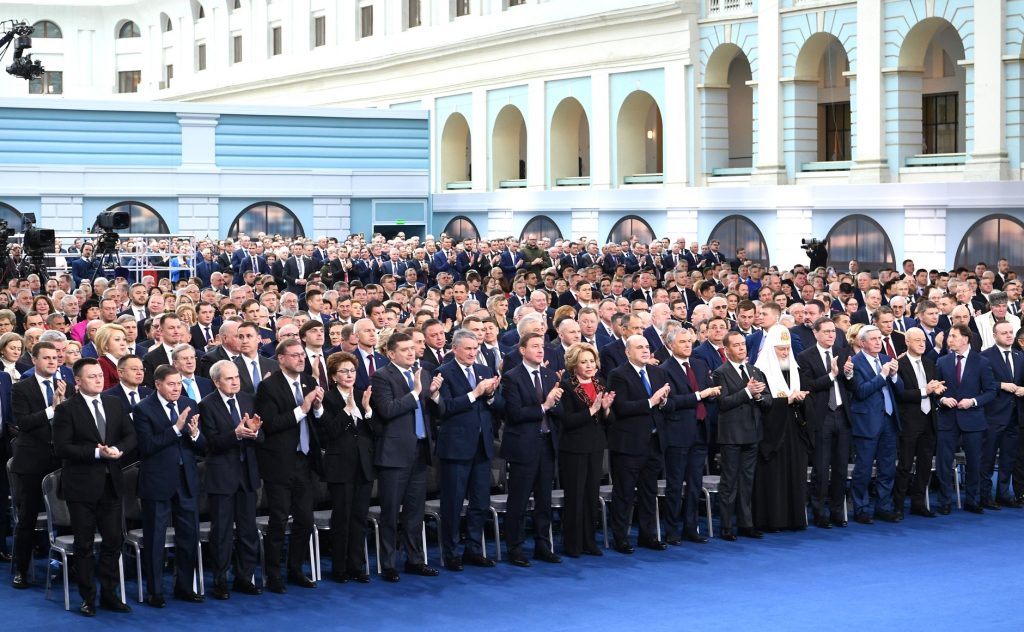
On Donbass:
- “I am proud – I think that we are all proud – that our multinational people, the vast majority of citizens, have taken a principled position regarding the special military operation, understood the meaning of the actions we are doing, supported our actions to protect Donbas.”
- “Special words for residents of the Donetsk and Luhansk People’s Republics, Zaporizhzhia and Kherson regions. You, dear friends, yourself determined your future in referendums. You made a firm choice, despite the threats and terror of neo-Nazis, in conditions when military operations were very close. Still, there was and is nothing stronger than your determination to be with Russia, with your Motherland”.
- “We have already begun and will continue to build up a large-scale program of socio-economic recovery and development of these new subjects of the Federation. It is also about reviving enterprises and jobs, the ports of the Sea of Azov, which has once again become an inland sea of Russia, and building new modern roads, as we did in Crimea, which now has a reliable land connection with all of Russia.”
- “I propose to create a special state fund. Its task will be targeted personal assistance to the families of fallen soldiers and veterans of the special military operation. In addition, he will coordinate the provision of social, medical, and psychological support, resolve sanatorium treatment and rehabilitation issues, help in education, sports, employment, entrepreneurship, advanced training, and obtaining a new profession.”
In Russia, there is a joke: “In every incomprehensible situation, immediately creating a new state fund.” In fact, if such a fund is created, it could seriously relieve the burden on the state budget and allow the Russian economy to develop without much reference to the number of dead and wounded. In itself, the formulation of the question is correct and economically literate, especially since the experience of the National Wealth Fund has shown that such funds are a safeguard against serious negative consequences for the country’s economy.
Statements about the construction of roads and other facilities should be positively received: from the image point of view, people have a positive attitude towards “creative” projects.
But in general, this block of the Address is addressed specifically to the inhabitants of the “new lands” and is a traditional set of promises and projects: it can be compared with Hitler’s speech during the Anschluss of Austria in 1938 or the speeches of representatives of the Soviet government at the National Assembly in October 1939 in Lviv. The essence is the same: “You have no idea how lucky you are that we won you.”
It is also worth noting that in his Address, Putin twice used the word “Novorossiya” concerning the occupied territories of Ukraine. This may be a hint at plans to unite these territories. At the same time, the question arises of how this plan can be implemented in Russian legislation. In any case, such theses should receive an appropriate response from the world community.
On economics:
- “The West has launched an economic front against us, but it has not achieved anything and will not achieve anything anywhere.”
- “Sanctions have provoked price increases and other problems in the West, but they are trying to blame the Russians for everything.”
- “Anti-Russian sanctions are only a means, and the goal is to make the people of the Russian Federation suffer, but the calculation of these Western “humanists” did not materialise.”
- “GDP in 2022 decreased by 2.1%; this is the most recent data, although, in March 2022, we were predicted to collapse.”
- “The Russian economy turned out to be much stronger than the West assumed when imposing sanctions.”
- “The Russian Federation allocated more than 1 trillion rubles to support the economy against the backdrop of sanctions, and not through emission, but on a solid market basis.”
- “The share of the ruble in Russia’s foreign trade settlements has doubled and amounted to one-third, taking into account the currencies of friendly countries – more than half”.
- “Russia is actually entering a new cycle of economic development”.
- “Unemployment in the Russian Federation is at a historic low of 3.7%.”
- “Implementation of several promising projects will make it possible to attract about 10 trillion rubles of investments to the Russian economy by 2030”.
- “We remember the problems faced by the late Soviet economy. Then it seemed sufficient to copy the Western market model. And as a result, our national economy has become more focused on the West – as a source of raw materials.
This is not the first time Putin has emphasised that Western sanctions have not had an effect and are not so terrible for the Russian economy. However, he does not consider that they seriously harm the interests of several representatives of big business, who lost a significant part of their income, real estate, yachts and aircraft abroad over the year. But in this respect, it is understandable why Putin handled the Address not to the elites, as before, but to the people: the thesis should remain in memory that it was not ordinary Russians who suffered, but oligarchs and top officials. And some even fled, becoming national traitors to Russia and not taking root in the West.
De facto, Putin plays populism, showing that there is no threat of sanctions, although, in reality, the sanctions have a prolonged effect and can seriously hit the Russian economy later.
On Russian business in West and emigrants:
- “If you remember, I, addressing big business, said that you are tormented by the dust of swallowing, running through Western courts. That’s how it all happened.”
- “None of the country’s ordinary citizens felt sorry for those who lost their capital in foreign banks.”
- “For the West, wealthy Russians are second-rate outsiders with whom they do whatever they want. And no purchased titles will help – they are second-class citizens there.
- “Don’t cling to the past and try to sue something abroad; you are strong people; invest in Russia.”
- “Putin: I want to be heard by those trying to run with outstretched hands in the West – it’s pointless.”
- “It is the people of Russia – the basis of sovereignty – the source of power.”
Also, the opposition of the Russian people to the “oligarchs”. “Oligarchs” are snickering cats; they were warned about the threat, they were given time to leave and withdraw their capital; they did not believe in the reality of the threats – now they are paying. And many (a hint of Fridman, Deripaska, Abramovich, not to mention Khodorkovsky, Chichvarkin and others) are trying to negotiate with the Western elites. Putin makes it clear that “Abroad will not help them.” However, he promised not to persecute them (one of the topics that have recently been discussed in the West is the possibility of eliminating billionaires objectionable to Moscow, following the example of the Skripals, Litvinenko or Berezovsky).
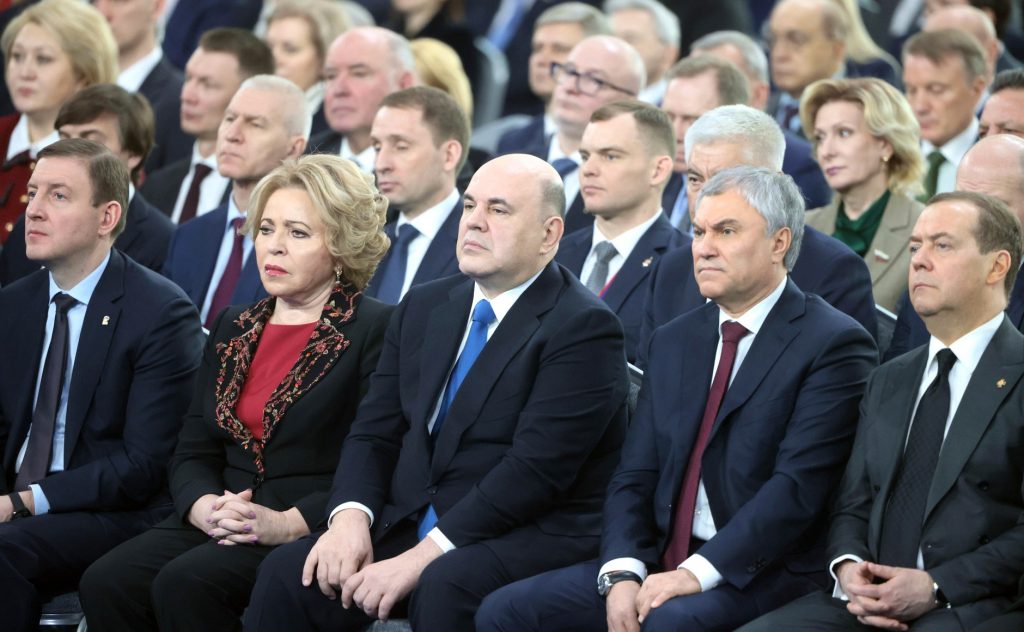
On education:
- Putin offered to return to the basic Russian education system in universities; the duration of education will be 4-6 years.
- Putin called for improving the quality of school and university programs so that young people learn as much as possible about Russia.
- Putin said that in 5 years, it is necessary to educate 1 million workers to ensure the security and competitiveness of Russia.
- “Serious changes are overdue in the higher education of the Russian Federation; a synthesis of the best practices of the USSR and the experience of the last decades is needed”.
- “Putin proposed to increase the educational tax deduction for children from 50 to 100 thousand rubles, the deduction for treatment – from 120 thousand to 150 thousand rubles.”
On the whole, a sound proposal (worth recognising), which again lies in the key of anti-Western rhetoric. Putin “closes” the West. He de facto abandons the Bologna system. There is nothing seditious in the same approach to this issue. Suppose Russia is already breaking off relations with the West. In that case, it must also abandon a system that is effective only in conditions of scientific, technical, pedagogical and intellectual cooperation with Western universities. The Soviet education system itself was no less effective. But she was different. That is, Russia is being prepared to be included in the race of intellectual programs. And if the Soviet Union had to engage in academic competition with the West, then modern Russia, after a severe brain drain and the scientific sphere destroyed by Kovalchuk, Medvedev and Shuvalov, would find it very difficult to compete with the West and China. Then, at least, it will be possible to speak about the fruits of new approaches to the education system no earlier than 10-15 years.
On war threat:
- “We know that the West is directly involved in attempts to strike at our aviation bases.”
- “A week ago, I signed a decree on putting new ground-based strategic complexes on combat duty.”
- “The drones that attacked airfields in the Russian Federation were equipped with the help of NATO instructors.”
- “Our relations with Washington have deteriorated, and this is entirely the merit of the United States.”
De facto, serious allegations have been made against the United States, and they accurately anticipate the justifications from the United States. Biden has already begun with excuses: during his speech in Warsaw, he answered Putin: “The US and Europe do not seek to destroy Russia. Millions of Russians who want to live in peace are not our enemies. This is Putin’s choice. Each new day of Putin’s war is Putin’s choice, not yours.” That is, Putin wants to divert the topic as much as possible: the war being waged is the US war against Russia, and Ukraine plays the role of an American “proxy”. Biden leads a different line: “We are not there,” while Putin is at war with Ukraine and the Ukrainian people.
On nuclear weapon:
- “The START Treaty was signed when the Russian Federation and the United States did not consider each other adversaries, but everything was left in the past.”
- “The United States tried to break the architecture of international relations created after World War II, reshaping the world order for itself.”
- “Russia Suspends Participation in START”.
- “There is no connection between START and the conflict in Ukraine.”
- “Before we return to the START discussion, we need to understand how to account for the nuclear arsenals of France and Britain.”
- “Some people in Washington are thinking about testing nuclear weapons, but then Moscow will also conduct them.”
- “The Ministry of Defense and Rosatom should prepare to conduct nuclear tests if necessary.”
- “World nuclear parity cannot be violated.”
This is the most critical point of the Address. Putin is suggesting that the US and the West start a conversation with a new Strategic Offensive Arms Treaty. This agreement does not work – for almost five years now. Suspension of Russia’s participation in the Treaty will not lead to anything: the Treaty itself does not provide for “suspension”; moreover, the Treaty is dead. Russia is sending a signal that it is ready to sign a new treaty but insists that other nuclear states – France, Britain and an unnamed China – join it. That is, instead of an agreement “for two,” – an agreement “for five”.
At the same time, several points – in particular, about the revision of the nuclear doctrine of the Russian Federation – are direct blackmail of the Eastern European states (Poland, the Baltic countries, the Czech Republic, Slovakia, etc.), since as a result of the revision they can become targets for Russian nuclear missiles. In fact, Putin is signalling to the Eastern European members of NATO that the more you get involved in the game on the side of Ukraine, the more likely you are to be bombed by Russia. The subtext, given the previous words: “We will not bomb Ukraine and Ukrainians, although they are lost, our brothers are more minor, and you are potential targets. Think.
Other:
• “The presidential elections in 2024 will be held strictly with the law, in compliance with all democratic procedures.”
• “It is those who were born in the Donbas and fought for it that should become the backbone of the development of new regions”. That is, Putin opposed the model proposed by Andrei Turchak and other United Russia functionaries: Donbas and new territories should become a personnel lift for new officials (“if you want to move up the career ladder, show your skills and organisational skills in the Donbas or Zaporizhzhia oblasts”). This position aroused criticism from local officials, who gradually set off from the “feeding trough”. De facto, Putin sent a signal to Pushilin, Pasechnik, Balitsy and Saldo: nominate and promote your cadres, and there will be no total invasion of appointees from other regions of Russia.
• “The state is the only controller and regulator; a public initiative only in the format of volunteering is a repeated trend of the Address.”
• Putin decided to invalidate the decree on measures to implement the foreign policy of the Russian Federation, which has been in force since 2012.
• “Russia will respond to any challenges, we are a united people, and the truth is behind us.” Again – a paraphrase: a direct parallel with the words of V. Molotov on June 22, 1941: “Our cause is just, the enemy will be defeated, victory will be ours!”
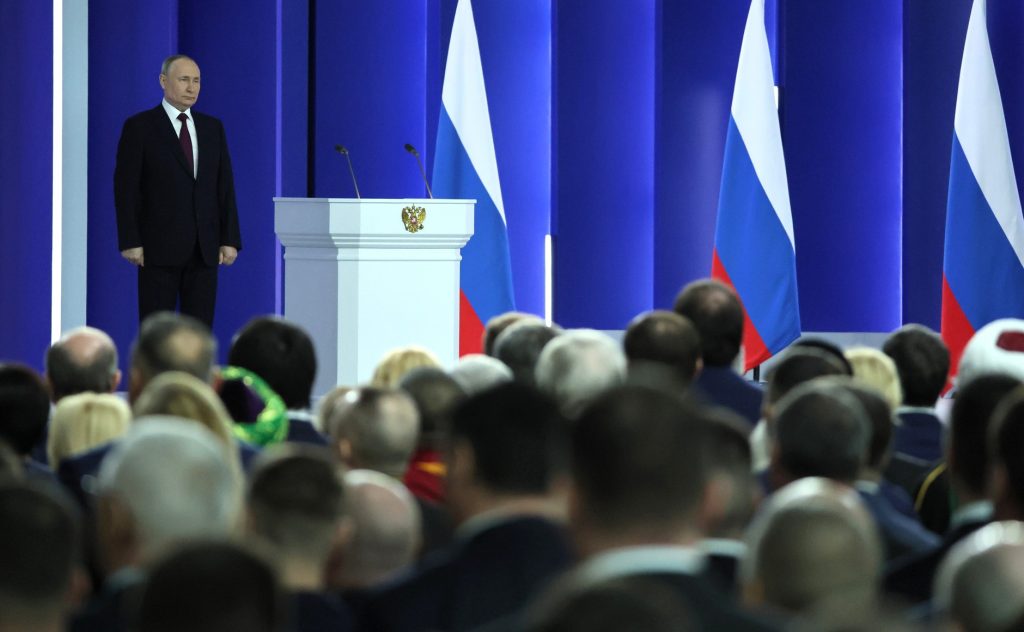
But in general, the Address “gave birth to a mouse”: the long expectations of something especially valuable and sacred did not come true. Putin said too little news. So we can conclude that the war will continue; the capture of Ukraine is not an end in itself; the goal of the war is to bring the United States to the negotiating table. And the Russians need to be reassured: “be patient, they say, not everything is as bad as it first seemed.” “We are stronger than ever.” “We cannot be defeated.” “Whoever behaves well will receive money from the state.” “Whoever misbehaves promises not to persecute. If, however, you manage to go abroad. Where you are not expected.
That’s the whole point of the Address…

